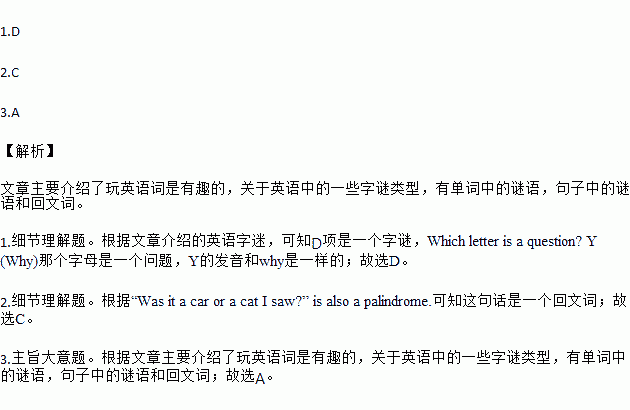题目内容
Has anyone told you that it’s fun to play with English words? For a long time these “words within words” in English have been used to surprise and educate us…and they often make us laugh too. Now we go to learn about them.
Riddles(谜语) How did the animals open the zoo door? They used a monkey! What’s the longest word in English? Smiles—there’s a “mile” between the first and last letters! These jokes —a question followed by a surprising answer — are known as “riddles”. But the ones above are examples of a special kind of riddle, a riddle which is funny because a word is hidden within another word. Many English speakers are crazy about this kind of words with double meaning. And it can be found in texts written in English a very long time ago. But riddles are not the only example of “words within words”. |
Hidden words During Victorian times (1837—1901), the game of hiding words within a whole sentence became popular. Look carefully at this sentence—The king eats his lunch in a fine palace. Can you see that the countries “China” and “Nepal” are hidden in it? The Victorians even used hidden words to teach children history and geography at school. Today we still see hidden word games in books and magazines, but we also use hidden words in jokes. |
Palindromes(回文词) Palindromes are words and phrases which can be read the same forwards and backwards. The pop group “Abba”, for example, is a palindrome. The sentence “Was it a car or a cat I saw?” is also a palindrome. We find them interesting, but they can also be funny: I kept receiving emails about reading maps backwards, but then I realized it was just spam(垃圾邮件)! |
1.Which of the following is a riddle?
A. step—pets, part—trap B. hiding words within a whole sentence
C. silent—listen, the eyes—they see D. Which letter is a question? Y (Why) .
2.By reading the article we can know “___________”.
A. Riddles are the only example of “words within words”.
B. Victorians even used riddles to teach kids history at school.
C. “Was it a car or a cat I saw?” is a palindrome as well.
D. These “words within words” in English often make us cry.
3.The best title of the passage is ________.
A. It’s fun to play with words B. “Words within words” educate us
C. Riddles & Hidden words D. The pop group “Abba”
 阅读快车系列答案
阅读快车系列答案
